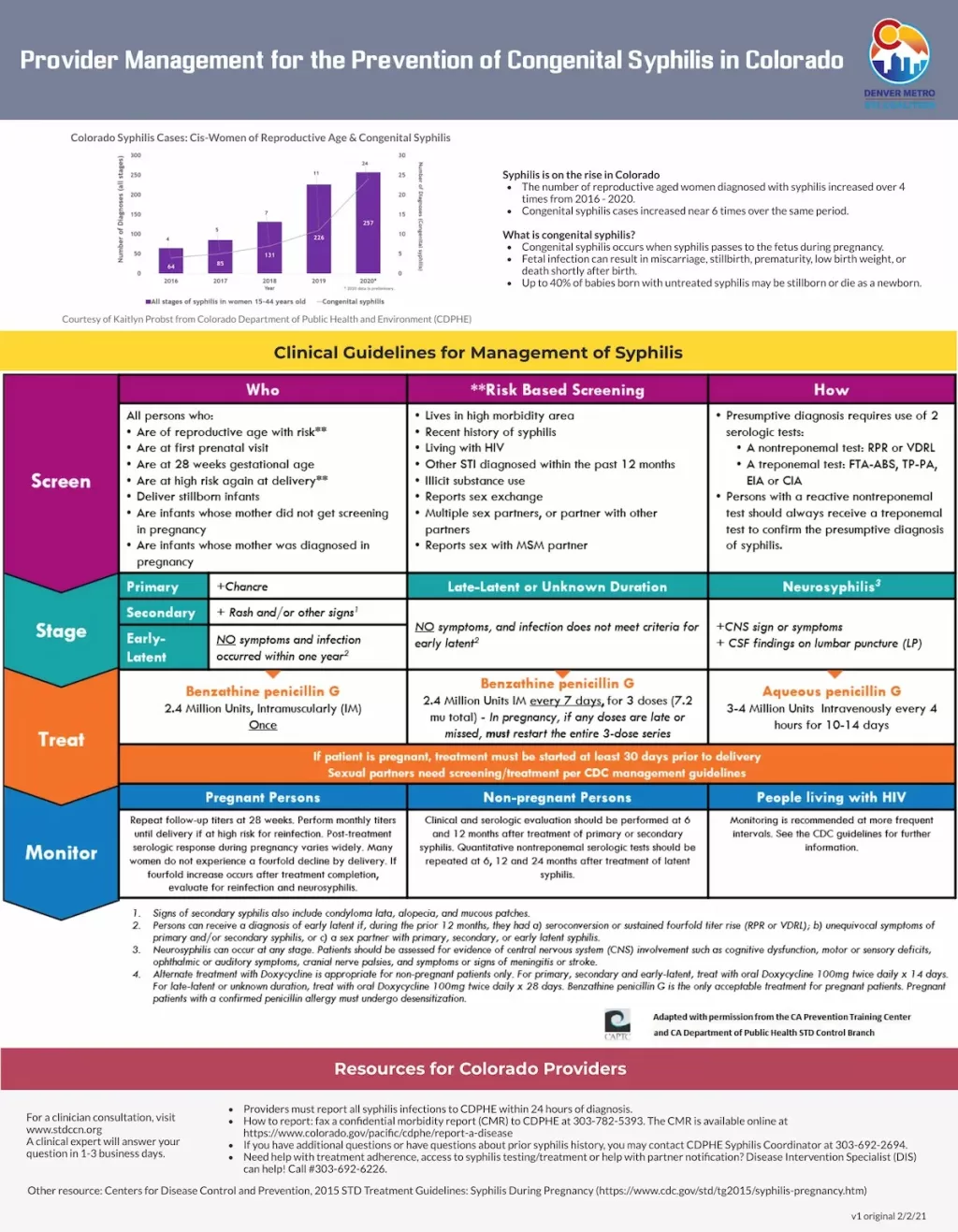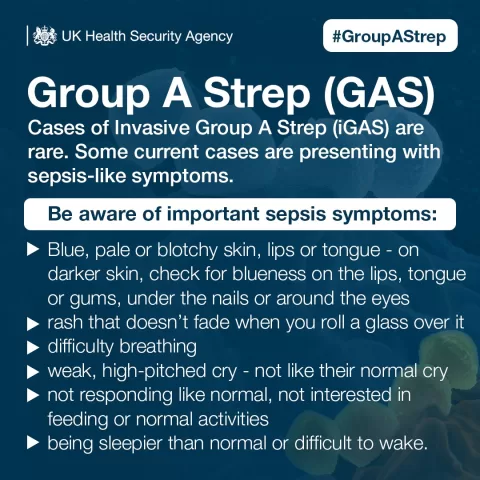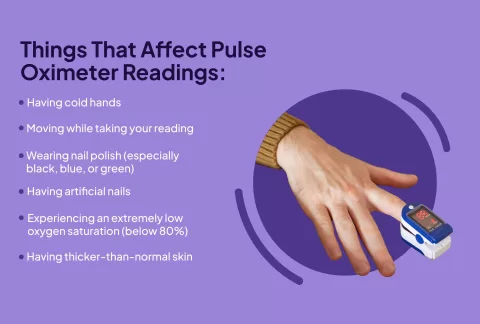Congenital syphilis Colorado is becoming a critical public health issue as the state grapples with a significant surge in cases over the past few years. Recent reports indicate that congenital syphilis cases in Colorado have increased sevenfold from 2018 to 2023, highlighting an urgent need for improved maternal syphilis testing and prevention strategies. With this alarming rise, Colorado’s governor has enacted a statewide public health order to facilitate better access to syphilis testing during pregnancy, aiming to reduce both the number of cases and associated tragic outcomes like stillbirths and newborn deaths. The state’s response underscores the importance of timely identification and treatment of syphilis in expectant mothers as part of a broader effort to combat sexually transmitted infections. Addressing the recent spikes in syphilis cases is crucial to safeguarding the health of both mothers and their infants in Colorado and beyond.
The rising prevalence of congenital syphilis in Colorado serves as a stark reminder of the broader challenges associated with maternal syphilis and sexually transmitted infections. As states implement strategies to combat these health threats, the public health response becomes essential in curbing the spread of infections that can severely impact newborn health. This includes increasing syphilis testing among pregnant women and addressing the conditions that contribute to these infections. The unfortunate trend echoes alarming global health statistics, reminiscent of responses needed during outbreaks like the recent measles incident in Wisconsin. Addressing the interrelated issues of maternal syphilis and congenital infections is vital for enhancing public health initiatives.
The Rising Impact of Congenital Syphilis in Colorado
In recent years, Colorado has witnessed a dramatic surge in congenital syphilis cases, marking a concerning trend in public health. The rise from 2018 to 2023 saw cases increase sevenfold, prompting the state’s governor to respond with an urgent public health order. This response aims to tackle the issue effectively by expanding access to syphilis testing for pregnant women, thus ensuring early detection and treatment of maternal syphilis. By implementing these measures, Colorado hopes to mitigate the risks associated with congenital syphilis, which can lead to severe health complications, including stillbirth and neonatal death.
The governor’s order underscores the critical need for a coordinated public health response to address maternal syphilis and its implications for both mothers and infants. As healthcare providers are mandated to offer testing more frequently, including in correctional facilities, it illustrates a proactive approach to combatting this alarming trend. These measures are essential not only for improving maternal health but also for safeguarding the future of newborns at risk of congenital syphilis, ensuring that they receive the necessary care and support.
Strengthening Syphilis Testing and Maternal Health Strategies
As Colorado ramps up testing for syphilis among pregnant women, the importance of routine syphilis testing cannot be overstated. Early detection allows for timely treatment, significantly reducing the risk of transmission from mother to child. The state’s initiative emphasizes the integration of maternal health services within public health frameworks, aiming to curb the rising incidence of syphilis cases. Enhanced testing protocols not only benefit individual health but also contribute to the overall reduction of syphilis within the community, ultimately leading to healthier outcomes for mothers and infants alike.
Moreover, effective education campaigns aimed at raising awareness about the risks of maternal syphilis play a crucial role in these public health strategies. As healthcare professionals receive training on the significance of syphilis testing, incorporating maternal health education into prenatal care practices ensures that expectant mothers are informed about their health risks. This comprehensive approach—blending testing, treatment, and education—represents a vital component of the broader effort to combat sexually transmitted infections and safeguard maternal and infant health.
Lessons from the Measles Outbreak in Wisconsin
The recent measles outbreak in Wisconsin serves as a crucial reminder of the importance of vaccinations and public health preparedness. The identification of a single measles case in Rock County has raised alarms, prompting swift action from health authorities to identify potential exposures and contacts. This outbreak, which is part of a broader increase in measles cases nationwide, highlights the interconnectedness of community immunity and public health responses to infectious diseases. In turn, this situation reiterates the importance of vaccinations as a protective measure against preventable diseases like measles.
Wisconsin health officials are collaborating with various departments to track and manage the outbreak, emphasizing a robust public health response that includes monitoring and assessing potential exposures at multiple locations. The efforts underscore the necessity for continuous vigilance in immunization practices and public health education. The measles outbreak reflects not only the need for immediate action but also the importance of maintaining high vaccination rates as part of a comprehensive public health strategy, thereby preventing the re-emergence of vaccine-preventable diseases.
Public Health’s Response to Measles: A Call for Vigilance
In the wake of the measles case reported in Wisconsin, the public health response has been swift, with several measures being implemented to curb potential spread. Public health officials have engaged in thorough contact tracing and notification processes, ensuring that anyone potentially exposed is promptly informed and monitored. This proactive approach is essential to prevent further cases and emphasizes the critical role of public health departments in managing outbreaks. The challenges posed by global increases in measles incidence necessitate that communities remain vigilant and responsive to vaccination needs.
Public health campaigns must reinforce the importance of vaccination against measles, particularly in the context of rising case numbers not only in the U.S. but globally. Education about herd immunity and the risks associated with vaccine hesitancy is paramount. By fostering a community ethos that prioritizes public health through vaccination, we can mitigate the risks of outbreaks like those witnessed in Wisconsin, thereby protecting vulnerable populations and enhancing overall public health.
The Importance of Addressing Maternal Health in Public Health
Maternal health remains a significant focus within public health as it directly impacts the well-being of both mothers and their children. Addressing issues such as maternal syphilis through targeted public health interventions underscores the broader commitment to maternal health initiatives. By promoting regular health screenings and access to care during pregnancy, states can reduce the incidence of congenital syphilis and improve health outcomes for mothers and newborns alike. Understanding the multifaceted challenges that pregnant women face is vital for developing effective public health policies.
Furthermore, maternal health is deeply entwined with social determinants of health, highlighting the need for comprehensive solutions that address inequalities. Programs aiming to enhance education, access to healthcare, and community support can significantly influence maternal and infant health outcomes. By fostering collaboration among healthcare providers, public health officials, and community organizations, states can effectively tackle the rising challenges posed by maternal syphilis and ensure healthier futures for families.
Antibiotic Resistance: A Growing Concern in Public Health
Recent findings regarding antibiotic resistance in uncooked meat highlight an urgent public health issue. High levels of resistant *Escherichia coli* found in raw meat pose significant health risks, necessitating rigorous public health interventions to address food safety. The study demonstrates that improper handling and preparation of food products can lead to the spread of resistant bacteria among consumers, calling for increased vigilance and education around food preparation practices.
The challenge of antibiotic resistance emphasizes the need for a multifaceted approach, including public health awareness campaigns and strict enforcement of food safety regulations. Collaboration between health agencies and the food industry is essential in mitigating risks associated with antibiotic-resistant pathogens. Such initiatives not only protect public health but also promote responsible use of antibiotics, addressing the root causes of resistance to ensure safer food consumption.
Enhancing Pediatric Infection Management in Hospitals
Quality improvement initiatives in hospitals across the U.S. have successfully led to more appropriate antibiotic prescribing for pediatric infections. By focusing on conditions such as community-acquired pneumonia, skin infections, and urinary tract infections, these programs have implemented measures such as audits and peer coaching to enhance treatment practices. Increased awareness and adherence to best practices are vital, especially as antibiotic resistance continues to rise, underscoring the need for responsible prescribing habits.
The success of these initiatives illustrates the capacity for healthcare systems to adapt and improve through continuous quality enhancements. By adopting evidence-based strategies and fostering a culture of collaborative learning among healthcare professionals, hospitals can better manage pediatric infections while minimizing the risks associated with antibiotic misuse and resistance. This proactive stance not only aims to improve patient outcomes but also strengthens the overall response to infectious diseases in the pediatric population.
COVID Vaccines and Neurological Concerns: A Meta-Analysis
Recent research published in *JAMA Neurology* has provided evidence that COVID vaccinations do not increase seizure risks, addressing common concerns surrounding vaccine safety. By analyzing data from extensive randomized trials, the study contributes to a growing body of literature that reassures both healthcare providers and the public about the safety of COVID vaccines. Understanding the neurological implications of vaccines is crucial in fostering public trust in vaccination efforts amidst ongoing pandemic challenges.
The findings highlight the importance of transparency in communicating vaccine safety to mitigate fears and misinformation. As health authorities continue to promote vaccination as a key strategy in combating COVID-19, reinforcing the safety profile of vaccines will be critical. This meta-analysis serves as a vital resource in public health messaging, reaffirming the commitment to ensuring the health and safety of populations while effectively addressing concerns related to vaccine side effects.
Chronic Wasting Disease: An Emerging Concern in Wildlife
The confirmation of chronic wasting disease (CWD) in wild deer in Pierce County, Wisconsin marks an alarming development for wildlife health and public safety. As health officials initiate measures to control the spread of CWD, including bans on baiting and feeding, attentiveness to wildlife health is crucial in preserving deer populations. CWD poses risks not only to wildlife but also entertains potential public health implications, necessitating immediate action and monitoring.
The response to CWD reaffirms the necessity of collaboration between wildlife agencies and public health officials to mitigate the effects of prion diseases. Education about CWD and its transmission is vital for hunters and the general public, emphasizing safe practices when handling wild game. By implementing effective control measures and educating communities, we can proactively address the challenges posed by CWD while safeguarding the ecosystem and public health.
Frequently Asked Questions
What actions is Colorado taking to combat congenital syphilis cases?
In response to the alarming rise in congenital syphilis cases, Colorado has implemented a statewide public health order. This order aims to improve testing access for maternal syphilis during pregnancy by requiring healthcare providers to recommend more frequent syphilis testing. The initiative specifically targets both general healthcare settings and correctional facilities to ensure comprehensive coverage.
How has the rate of congenital syphilis changed in Colorado recently?
From 2018 to 2023, Colorado witnessed a dramatic sevenfold increase in congenital syphilis cases. Health officials have confirmed 25 cases in 2023 alone, highlighting a growing public health concern that necessitated immediate action from the state government.
What is the impact of maternal syphilis on newborns in Colorado?
Maternal syphilis poses significant risks to newborns, which is evidenced by the confirmed cases in Colorado, including five stillbirths and two newborn deaths this year. This stark reality underscores the need for increased maternal syphilis testing and timely treatment during pregnancy.
How does testing for congenital syphilis relate to public health efforts in Colorado?
The public health response aimed at congenital syphilis in Colorado focuses on expanding access to syphilis testing for expectant mothers. Regular and frequent testing during pregnancy is crucial in preventing transmission of syphilis from mothers to their babies, thereby protecting newborns from congenital syphilis.
What parallels can be drawn between the rise of congenital syphilis and public health trends like those observed with measles outbreaks?
Both congenital syphilis and the recent measles outbreak investigated in Wisconsin reflect larger trends in public health concerning vaccine-preventable diseases and sexually transmitted infections. The response to increasing congenital syphilis cases in Colorado demonstrates the importance of proactive public health measures similar to those utilized during vaccine outreach efforts aimed at controlling measles outbreaks.
What role does syphilis testing play in preventing congenital syphilis in Colorado?
Syphilis testing is a critical element in preventing congenital syphilis in Colorado. The state’s public health order mandates that healthcare providers offer testing during pregnancy to identify infected individuals early. This allows for timely treatment and reduces the risk of transmission from mother to child.
| Key Point | Details |
|---|---|
| Rise in Congenital Syphilis Cases | Congenital syphilis cases in Colorado have increased sevenfold from 2018 to 2023, with 25 confirmed cases this year, including five stillbirths and two newborn deaths. |
| Public Health Order Issued | The governor has issued a statewide public health order to improve access to testing during pregnancy and requires more frequent testing by healthcare providers, including within correctional facilities. |
| Concurrent Measles Cases in Wisconsin | A measles case reported in Wisconsin is part of a larger trend of rising infections globally, with 128 cases identified nationally as of late April 2024. |
Summary
Congenital syphilis in Colorado has become a pressing public health concern, driven by a significant rise in cases over the past few years. The Colorado governor’s recent response to this alarming trend includes a public health order aimed at expanding testing access during pregnancy and improving healthcare provider compliance with testing protocols. This concerted effort is critical to combating congenital syphilis and safeguarding maternal and infant health in Colorado.
The content provided on this blog (e.g., symptom descriptions, health tips, or general advice) is for informational purposes only and is not a substitute for professional medical advice, diagnosis, or treatment. Always seek the guidance of your physician or other qualified healthcare provider with any questions you may have regarding a medical condition. Never disregard professional medical advice or delay seeking it because of something you have read on this website. If you believe you may have a medical emergency, call your doctor or emergency services immediately. Reliance on any information provided by this blog is solely at your own risk.








